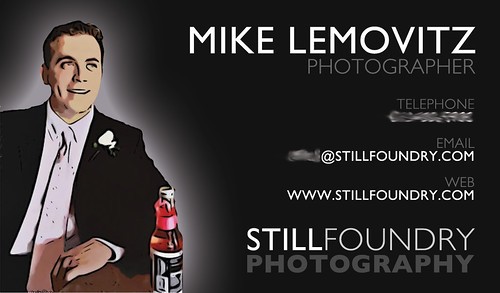just something to keep in mind but if you put your logo on your pictures and say copyrighted by (your logo) it really doesn't mean anything unless you register your logo. and that costs a lot of money. so keep in mind if you ever get popular somebody can use your logo and you couldn't do anything about it because you don't own it. I'm not really for sure on this but i know my uncle owns his own business and at one time he had problems because another company was using his business name and because it wasn't registered to him he couldn't do anything about it. he eventually registered another name and a logo and he said it was really expensive. like i said I'm not for sure about this but for anyone who says otherwise make sure you take it with a grain of salt because some of the people on here talk out their a** when it comes to business advise. they really just offer opinions or guesses and have no business experience. i know im getting a little of topic but i guess this is just good advise to everyone who is thinking of using a logo or business name.
Little of the above quoted information is accurate, as hey it's scotty readily admits,
"I'm not really for sure on this but".
One mostly true statement is:
"like (sic)
i (sic)
said I'm not for sure about this but for anyone who says otherwise make sure you take it with a grain of salt because some of the people on here talk out their a** when it comes to business advise (sic).
they (sic)
really just offer opinions or guesses and have no business experience.", thus proving his point by himself offering opinion and a couple of outright guesses about trademarks and business name registration.
The cost to register a business name will vary by city, county and state.
Consult the United States Patent and Trademark Office's web site
www.uspto.gov, or a qualified attorney, for accurate trademark information. The USPTO is an agency of the United States Department Of Commerce and has no direct relation to copyright law or copyright registration with the US Copyright Office, an office of the US Library of Congress.
As far as the cost to register a trademark:
"The filing fee is either $275.00 or $325.00 per class of goods and/or services for an electronically-filed application (the "TEAS Plus" or "regular TEAS" options, respectively), compared with $375.00 per class if filed in paper; i.e., while an application may only have one mark, it may cover multiple classes; e.g., an application filed under TEAS Plus with two classes would be for both computer software in Class 9 and t-shirts in Class 25, making the filing fee $550.00. Although only one mark is permissible per application, a mark may consist of several elements that are joined to form a composite whole; e.g., words plus a design. You do not have to have already used your mark before filing an application. However, if the mark has not already been used in interstate commerce at the time of filing, but instead the application is based on an "intent-to-use" the mark in interstate commerce in the future, an additional fee of $100.00 per class will be required when the "Allegation of Use" form is submitted (whereas a "use-based" application does not require this additional fee).
WARNING: The filing fee is a processing fee for the application. This fee is not returned even if ultimately the USPTO does not issue a registration. You should take all necessary steps to ensure the mark is registrable before filing the application." ......per
TEAS FQAs
Not very expensive relative to recurring business expenses.
Logo's are trademarks and trademarks don't
have to be registered to be legally protected. They just have to be used.
If you quit using a trademark, even a registered trademark, it becomes fair game for anyone else. Literally, if you don't use it you can lose it.
Trademarks must be registered (not pending) before you can use the ® symbol with the TM or SM (Service Mark) abbreviations.
If you would like international recognition of your trademark, you should become familiar with the provisions of the Madrid Protocol, similar to the Berne Convention's relationship to international copyright laws.








![[No title]](/data/xfmg/thumbnail/34/34041-c8aed4d2c55b167d1ec03d9cfbaca453.jpg?1734164448)


![[No title]](/data/xfmg/thumbnail/34/34040-14af4007923299ad46d35fc110d0faad.jpg?1734164446)



